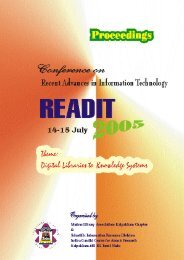READIT-2007 - Indira Gandhi Centre for Atomic Research
READIT-2007 - Indira Gandhi Centre for Atomic Research
READIT-2007 - Indira Gandhi Centre for Atomic Research
Create successful ePaper yourself
Turn your PDF publications into a flip-book with our unique Google optimized e-Paper software.
Those librarians who have the needed set of knowledge management skills are in<br />
great demand and are employable all the times. The strategic position of librarians in<br />
the knowledge environment has never been more promising.<br />
7. CONCLUSION<br />
When we compare the role of LIS profession in those traditional days to their<br />
role expected in this knowledge environment, what we see is that the roles have<br />
remained same. What has changed is how these roles are per<strong>for</strong>med. Today’s LIS<br />
profession relies heavily on ICT tools <strong>for</strong> knowledge management activities.<br />
Knowledge environment has posed several challenges which are no doubt staggering.<br />
While the great core of principles, practices and values they espouse remains relevant,<br />
the skills and knowledge required to per<strong>for</strong>m their jobs are constantly changing.<br />
These developments require increased technological skills to ensure appropriate and<br />
effective action on the part of in<strong>for</strong>mation professionals.<br />
REFERENCES<br />
1. Balyan, R K; Knowledge management and human resource development. Indian Journal<br />
of Training and Development, <strong>2007</strong>,35(1), 125-137.<br />
2. Bansal, A; Knowledge management: A review. DESIDOC Bulletin of In<strong>for</strong>mation<br />
Technology, 2000, 20(4), 3-9.<br />
3. Das, K; Chauhan, K and Jena, S; Skill, competency and development of professional<br />
staff in challenging dynamic web environment. In H. Chandra (Ed.), Initiatives in<br />
Libraries and In<strong>for</strong>mation Centers in the Digital Era. Proceedings of the National<br />
Conference Papers, Coimbatore: SALIS , 8-10, Jul 2006, pp225-229.<br />
4. Halkar, GG and Gupta, S; Knowledge management: A challenge <strong>for</strong> the 21st century.<br />
Indian Journal of Training and Development, 2005, 35(1), 53-61.<br />
5. Hawkins, B; . Libraries, knowledge management, and higher education in electronic<br />
environment, 2000. Retrieved May 11, <strong>2007</strong>, from http://conferences.alia.org.au<br />
/alia2000/proceedings/brian.hawkins.html.<br />
6. Jain, KK; Knowledge sharing: Role of human resource development. Indian Journal of<br />
Training and Development, 2005, 35(4), 5-18.<br />
7. Mertins, K; Heisig, P and Vorbeck, J; Knowledge management: Best practices in Europe.<br />
Berlin: Springer, 2001.<br />
8. Mestri, M; Kumbargoudar, P; and Gobbur, DS; Design of training programmes <strong>for</strong> LIS<br />
professionals in emerging ICT environment, 2006. In H. Chandra (Ed.), Initiatives in<br />
Libraries and In<strong>for</strong>mation Centers in the Digital Era. Proceedings of the National<br />
Conference Papers, Coimbatore: SALIS 8-10, Jul , pp230-237.<br />
9. Pitroda, S; National Knowledge Commission – Report to the Nation 2006. New Delhi:<br />
National Knowledge Commission, Government of India, 2006<br />
8

















